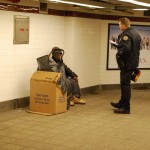Losing the Fight Against Loitering
 The judicial campaign against anti-loitering laws has often been heedless of the public’s interest in being free from chronic public nuisances.
The judicial campaign against anti-loitering laws has often been heedless of the public’s interest in being free from chronic public nuisances.
New York finally got around to repealing provisions of its anti-loitering statute long ago declared unconstitutional. It’s about time. Only recently, some poor police officer had been sued for making an arrest for violating the statute. The officer’s case went all the way to the Second Circuit Court of Appeals before being dismissed. After all, observed the court, the officer “reasonably, but mistakenly” believed that the statute, which was still on the books, was valid and enforceable.
At the same time, New York is not replacing the repealed provisions with revised statutes that could pass constitutional muster. That is unfortunate, for the cases overturning anti-loitering laws deserve some pushback from legislatures. The judicial campaign against anti-loitering laws has often been heedless of the public’s interest in being free from chronic public nuisances. In Papachristou v City of Jacksonville, for example, Justice William “Wild Bill” Douglas wrote an embarrassing panegyric to the value of wandering and strolling:
These amenities have dignified the right of dissent and have honored the right to be nonconformists and the right to defy submissiveness. They have encouraged lives of high spirits rather than hushed, suffocating silence.
All very well, but there is also a value in feeling safe when one goes out in public. Streets rife with vagrants or panhandlers are also streets that ordinary people avoid. When the disorder becomes chronic, those who can afford to flee the city do so, leaving those who can’t to suffer all the more. With due respect for the late Justice Douglas, there are few silences more suffocating than that of an abandoned downtown.
To their credit, the cases striking down provisions of New York’s anti-loitering statute have acknowledged the interests of ordinary city dwellers. The court that ended up voiding New York’s anti-begging provision poignantly described the evils of panhandling:
[B]eggars tend to congregate in certain areas and become more aggressive as they do so. Residents are intimidated and local businesses suffer accordingly. Panhandlers are said to station themselves in front of banks, bus stops, automated teller machines and parking lots and frequently engage in conduct described as "intimidating" and "coercive." Panhandlers have been known to block the sidewalk, follow people down the street and threaten those who do not give them money. It is said that they often make false and fraudulent representations to induce passers-by to part with their money.
Nonetheless, the court held, New York’s statute violated panhandlers’ First Amendment right to engage in expressive conduct in a traditional public forum. The Procrustean categories of First Amendment doctrine contrast strikingly with the complexity of the problem that the anti-begging statute addresses, namely, how to preserve a safe urban environment. The presence of panhandlers seriously impedes the freedoms of city residents, yet, in the court’s view, those freedoms must still lose out to the supposed expressive freedom of beggars.
Fortunately, the decisions striking down anti-loitering laws have never held that all anti-loitering or anti-begging statutes are inherently unconstitutional. As Robert Ellickson of Yale Law School has argued, if an anti-begging statute prohibits panhandling only in certain zones, and leaves beggars free to beg in other areas of the city, it could survive constitutional attack. Such a statute would create safe havens for the public, particularly in downtown areas that suffer the most from chronic vagrancy. Likewise, the Supreme Court has stated that anti-loitering statutes are not necessarily void for vagueness if the prohibited conduct has a harmful purpose or effect, such as (perhaps) harassment of pedestrians. Thus, anti-loitering statutes do not have to be scrapped entirely. They just need to be better crafted.
Of course, a volunteer army of civil rights lawyers can be depended on to challenge any anti-loitering statute. But the first duty of government is to ensure the safety of the citizens. New York and other states should give police the maximum tools to do so. The opposition to these laws can only go so far.